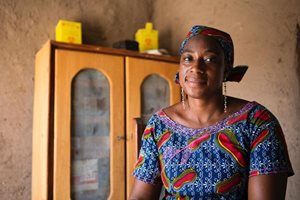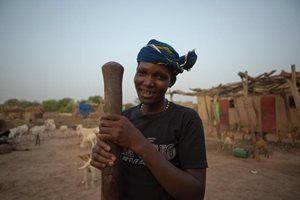On March 8
th, for International Women’s Day, we wanted to share a couple stories of inspiring women who have made a difference in their Malian communities and, with the help of Red Cross programs, have helped save lives and improve livelihoods.
Twenty-seven-year-old Korotoumou Diallo spent three years studying to be a nurse with the intent to help her fellow countrymen in Mali as soon as she graduated. She became a Community Health Worker (CHW) within the Maternal, Newborn and Child Health project, run by the Malian and Canadian Red Cross in collaboration with Mali’s Ministry for Health and Public Hygiene.
Driven by a desire to help young women and

children, Korotoumou is one of the 224 CHWs sent to villages which had little or no access to health care and excessively high mortality rates. Her traditional upbringing had taught her the meaning of hard work. Day and night, with unfaltering patience and rigour, she receives each and every mother and child. Her contemporary education has taught her pragmatism, dispensing treatment that gets the job done.
There is no time to waste with four major diseases working around the clock: malaria, diarrhoea, malnutrition, and pneumonia are responsible for 75% of deaths.
Her tiny clinic is never empty and there are always half a dozen women waiting their turn. Everyone knows that Korotoumou is always there for them, with a kind word and the treatment they need.
Three years on, the results speak for themselves: the mortality rate has fallen drastically, Korotoumou has earned the trust of families in the village and no one wants to see her go. Korotoumou says she feels at home here and wants to carry on with her mission of providing effective modern treatment.
When Malian and Canadian Red Cross volunteers first brought the Maternal, Newborn and Child Health project to her small Malian village of 1,000 people, 27-year-old Sali Diabaté didn’t think twice

before getting involved.
As well as sending Community Health Workers to villages located far from health facilities, the project also encouraged villagers to adopt certain vital daily habits that improve living conditions and hygiene standards. Sali was one of the first to support the Red Cross volunteers in their endeavours and she persuaded other women in the village to follow their advice. Sali convinced women to set up a weekly clean-up of the entire village. Every Sunday, women take to the streets armed with brooms and wheelbarrows to clean every inch of Sana.
"This project is absolutely vital for us,” explained Sali. “After three years, people have realized that lives are being saved. There hasn’t been a case of infant mortality or deaths of young mothers for months.”
Sali has three children: "I was pregnant four times but lost a one-year-old baby. That was before the Community Health Worker came and there wasn’t a health care centre in the village. My daughter had repeated bouts of fever but my husband wasn’t here so we couldn’t take her to the health facility over 10 kilometres away. One day she had a really bad attack. We managed to get her to the clinic by bicycle but it was already too late. Here in Bambara, when a child suffers from convulsions, we say he has been taken by a bird. We call it ‘Kônô’. It was, in fact, malaria."
Today, thanks to the Ministry of Health and Public Hygiene and support from the project, the women here can count on the CHW to react at the slightest sign of fever or diarrhoea. Also, the women no longer spend as much time watching over sick children and are free to turn their attention to revenue-generating activities. Around Sana, there is now a huge garden and the women can turn their hand to agriculture. The Red Cross project has given women like Sali greater autonomy and they are now free to become financially independent.
Read more about the work of the Canadian Red Cross on improving the health of mothers, newborns and children.